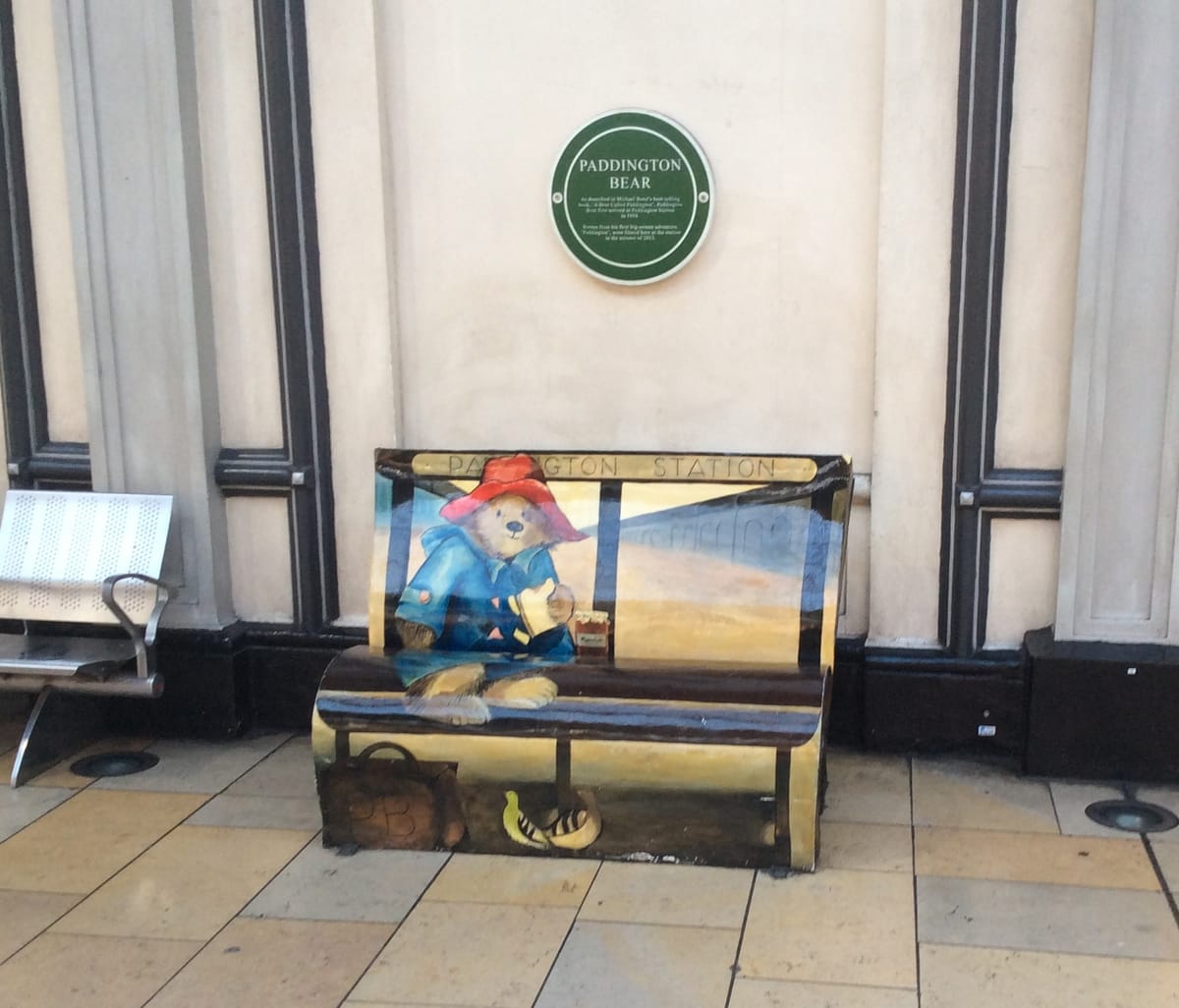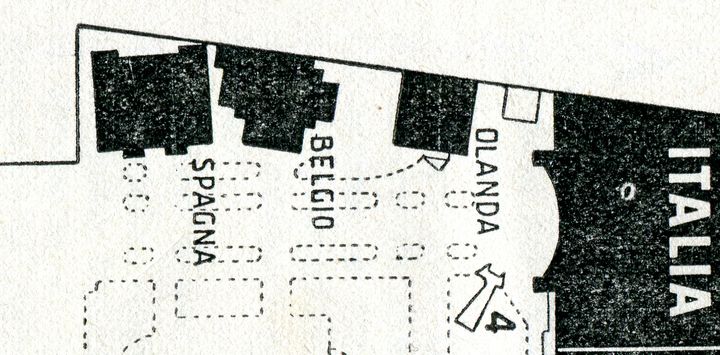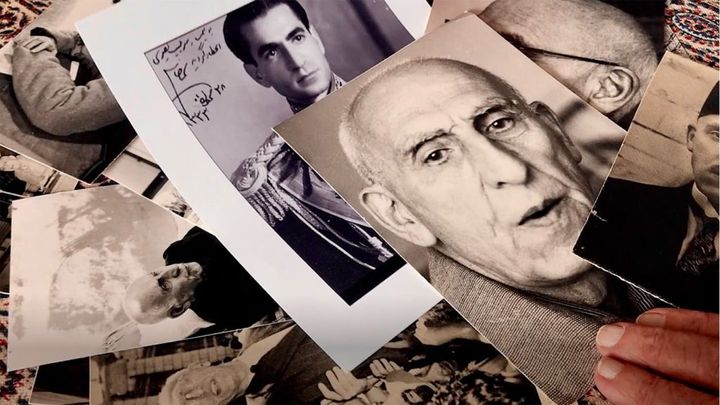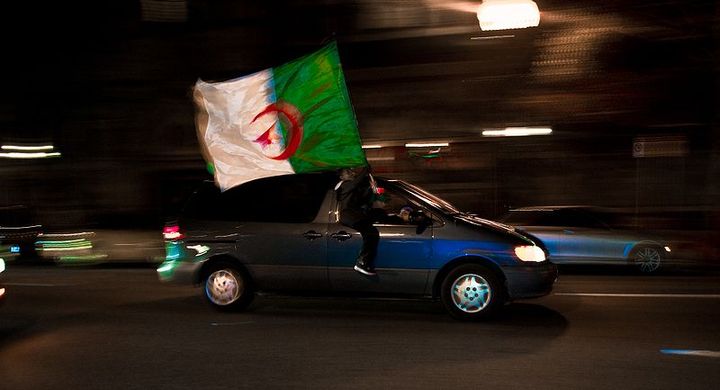For the last decade or so, we have been hearing news and reports on the UK government’s immigration policies—policies to reduce the number of immigrants, not ones to welcome immigrants. According to an article in The Guardian on 30 November 2023, Rishi Sunak “says he will ‘do what is necessary’ to bring down net migration, under pressure from the Conservative right.”[1] The government announced on March 11th 2024 that “[n]ew rules to radically cut net migration and tackle visa abuse are now in force as part of the government’s plan to bring down unsustainable levels of legal migration.” In addition, from the 4th of April, “the minimum salary required for those arriving on the Skilled Worker visa will increase from £26,200 to £38,700” which, according to the government: “will further drive down numbers, reduce pressure on public services and prevent the undercutting of British workers by employers who look to recruit cheap labour from overseas.”[2] The MPs are also currently debating a deportation bill, which, if enacted, will enable the UK to send asylum seekers to Rwanda. Perhaps more than any other time, we should now consider the life and adventures of Paddington and his best friend Mr Gruber in the famous children’s book series and the film adaptations, to remind ourselves of the important roles immigrants have historically played within and for British society. This article is going to focus on Mr Gruber, an immigrant from Hungary, in the Paddington books and films. Who is he? And where did Michael Bond, the author of the original series, get the idea that Paddington’s best friend should be another immigrant?
Let us briefly review the synopses of the Paddington series and its first film. The original story (first published in 1958) begins with a little bear cub who comes to England by boat from a place called Darkest Peru. He is spotted by Mr and Mrs Brown when he is at a loss at Paddington Station. The little bear eventually begins to live with the Brown family and their housekeeper at 32 Windsor Gardens, London. The story is both comical and heart-warming, going around their daily life in London and occasional trips overseas. The bear has a Peruvian name, but as Mr Brown cannot pronounce it well, the husband and wife give the bear an English name, “Paddington,” after the station where they all first met.
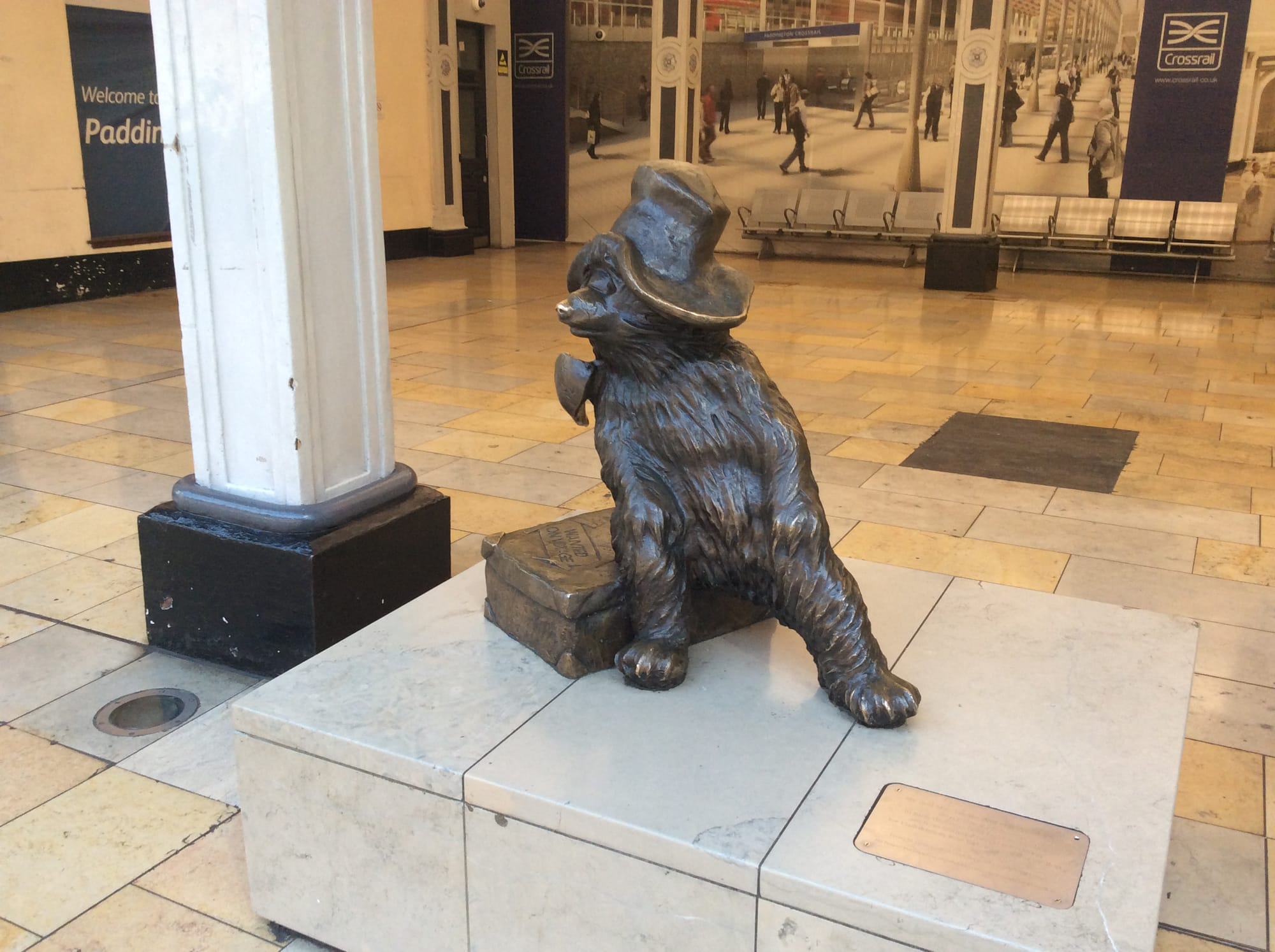
The film Paddington (released in 2014) follows almost the same storyline in that the bear meets the Brown family at Paddington Station and comes to live with them. However, a major change can be found in the newly added episode about Montgomery Clyde and his daughter, Millicent Clyde. Montgomery Clyde is an English explorer and a member of the Geographers’ Guild of Great Britain.[3] In the prologue of the film, he meets and becomes friends with Paddington’s aunt and uncle in Darkest Peru. When he returns to Britain, he leaves a message to the bears that they will be welcome in England. Upon his return, he is asked by members of the Geographers’ Guild to present taxidermies of the bears or reveal their whereabouts. He refuses to do so to protect the bears and is expelled from the Guild. Some 40 years later Paddington arrives in London and Montgomery's daughter Millicent Clyde, now the head of the taxidermy department at the Natural History Museum of London, sets out to capture and stuff Paddington to restore her father’s honour and dispel her own troubled past.
As in the original series, in the film, Mr Gruber runs an antique shop on Portobello Road. However, in the film, his role extends only to conveying to Paddington that the hat Paddington wears belonged to a member of the Geographers’ Guild. In the original book series, in contrast, Mr Gruber, a fellow immigrant, becomes Paddington's closest friend. He teaches Paddington about British culture and customs, but also offers mental support to Paddington as a senior immigrant who has lived in Britain for a long time and has a deep understanding of Paddington’s status as a young immigrant.
Whether considering the original book series or the film adaptations, it is impossible to discuss them without linking them to the issues of immigration. Reviews of the films relate them to the social context of the UK since Brexit. For example:
...if the first film proved to be an unlikely appeal for acceptance in the face of worries surrounding immigration, then this post-Brexit sequel is even more pointed in both its critique or prejudice and its celebration of the ways in which multiculturalism can enrich communities.[4]
The review quoted was of the film Paddington 2 (released in 2017), and thus refers directly to Brexit. The same tone, however, can be found in discussions of the first film which was released in the exclusionary climate in the UK that led up to the referendum in 2016. In fact, Paddington, the film, calls for multiculturalism and social cohesion; and criticises xenophobia and narrow nationalism. For example, when confronted by Millicent, the would-be bear taxidermist, Mr Brown responds:
it doesn’t matter that he[Paddington] comes from the other side of the world or that he’s a different species or that he has a worrying marmalade habit. We love Paddington. And that makes him family. And families stick together![5]
Mr Brown shouts this at Millicent, and refuses to hand Paddington over to her. Mr Brown’s way of looking at Paddington sharply contrasts with Millicent’s. Millicent’s exclusionary view causes her to see Paddington as nothing but an animal. At the end of the film, Paddington observes:
Mrs Brown says that in London everybody is different but that means anyone can fit in. I think she must be right because although I don’t look like anyone else, I really do feel at home. I will never be like other people, but that’s alright. Because I’m a bear.[6]
In the film, we hear a calypso song “London Is the Place for Me” in both the opening and closing credits. The film uses a cover, but the original song was composed by Aldwyn Roberts, otherwise known by his stage name: ‘Lord Kitchner’. Roberts was a passenger on the HMT Empire Windrush in 1948, the ship whose name inspired the term “Windrush Generation”; as he disembarked in Tilbury, England he sang his latest composition:
London is the place for me.
London that lovely city.
You could go to France or America
India, Asia or Australia
You’re gonna come back to London City.
To live in London you are really comfortable
Because the English people are very much sociable
They take you here and they take you there
And they make you feel like a millionaire
London that’s the place for me.
This song presents the positive image of the host society held by contemporary immigrants from the Caribbean, who dreamed of a better life in the UK. Throughout the film, a black band repeatedly appears on-screen and sings. Their performances suggest a clear link between the film and the history of immigration from the Caribbean, particularly Jamaica and Barbados, in the 1950s and 1960s. The repeated use of this song in the film not only foregrounds Paddington’s characteristics as an immigrant but also draws a parallel between post-war immigration in the 1950s and 1960s and immigration in 21st-century Britain.
It should be noted that the original book series and the film adaptations are set in different times. Migrants in each setting refer to different groups of people, and their relationship with British society should also be contextualised differently. The immigrant group that should be specifically identified in the social context of the film’s release year is that of EU countries. The first film was released in 2014, before the 2016 referendum. It was the time when growing xenophobia and nativism against immigrants from EU countries, especially from Eastern Europe, was already a social concern that could not be overlooked.
Mr Gruber in the original series is an immigrant from Hungary, but in the film he is German. This is clear in the subtitles of one of Mr Gruber’s lines: “(German man) Ah, Mrs Brown. Come in.” In the film series, he is even given the first name “Samuel,” which can be found nowhere in the original story. Interestingly, Michael Bond expressed his disappointment with the choice of an English actor (Jim Broadbent) to play Mr Gruber in the 2014 film. For Bond, the image of Mr Gruber is non-British: “Bond said that his main complaint about the film adaptation of Paddington was he wanted someone foreign to play Gruber, ‘because he was based on my first agent, a lovely man, a German Jew.’”[8]
Given the social milieu surrounding British society in the early 2010s, the episode of Mr Gruber's arrival in the UK, and the change of his nationality from Hungarian to German in the film start to take on greater importance. Working with these differences, we can see an attempt to link the issues of immigration from Eastern Europe with the history of migration to the UK during World War II. Mr Gruber is described as a “refugee” both in the original books and in the film, but in the original story, the reason he came to the UK is not stated. We only know that he left Hungary for South America, and spent some years there before he eventually moved to the UK.
Mr Gruber’s characterisation is partly based on Michael Bond’s literary agent, Harvey Unna. Unna was a German Jew. He was about to become the youngest judge in German history when he had to exile from Germany to Britain with few possessions with him; one of his acquaintances told him that his name was on the Nazis’ list of Jews to be arrested.[9] In his autobiography Bears and Forebears: A Life So Far, Bond elaborates his idea to create another immigrant character in the story who would support Paddington as a fellow immigrant. Bond also writes that when he was working for the BBC during the war, he was working in a multinational environment. According to him, his Hungarian colleagues were the most polite and philosophical about the problems of life, and therefore he thought a Hungarian would be ideal for the portrayal of a character who would welcome Paddington as a friend.[10]
While it is possible to identify the models of this Hungarian character in the original series, it is not so straightforward to correspond his emigration to the UK to any historical events that occurred in our real world. The history of migrants and refugees from Hungary to the UK shows that a considerable number of political exiles came to the UK after the failure of the Hungarian Revolution of 1956.[11] Bond might have been inspired, to some extent, by this event for his creation of Mr Gruber in the first book A Bear Called Paddington published in 1958. However, in the story, Mr Gruber has already established his antique shop business and is portrayed as a man who has lived in England for a long time and is familiar with British culture. Therefore, the question remains as to his quick adaptation to life in England only in a couple of years from 1956. To see the story from a different angle, another possible candidate would be the influx of refugees from South America to Britain as a result of the 1974 revolution in Chile. This matches Mr Gruber’s own explanation that he first travelled to South America, possibly as a refugee of the Hungarian Revolution of 1956, and then moved to the UK for some reason. The historical record shows that some Hungarians also fled to South America after the 1956 Revolution.[12] However, this does not chronologically fit with the publication years of the children’s book series. One more possibility is that Mr Gruber might have come to the UK when Jews living in Hungary fled the country in the interwar period.[13] Considering that Mr Gruber is an elderly man, this is probably the most likely, but not conclusive. Hence, it would be more appropriate to understand his creation as a fusion of all or some of the above-mentioned elements.
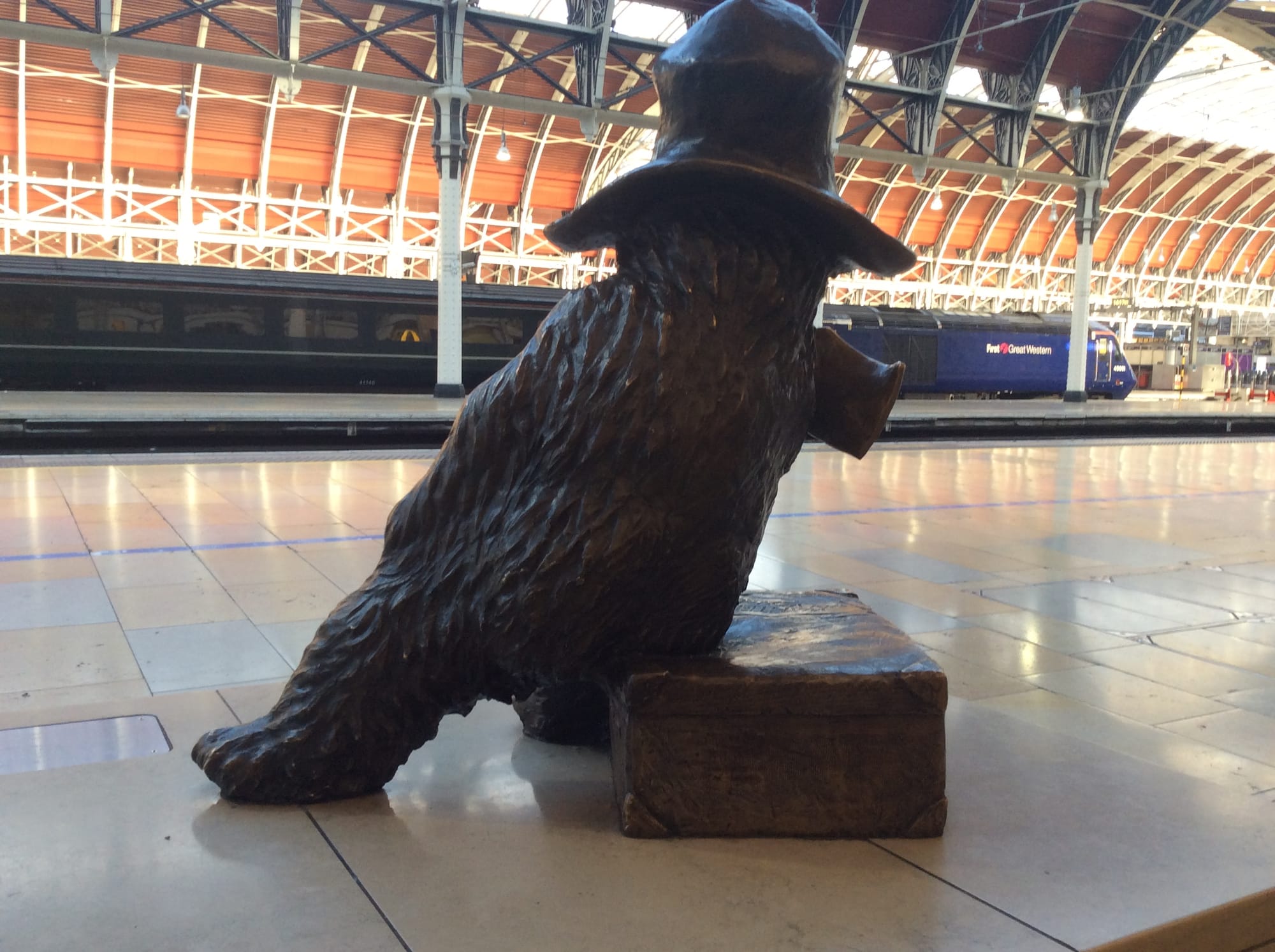
In contrast, the film is quite suggestive of how he came to the UK. When Paddington and Mrs Brown visit his antique shop, he tells them that he arrived in England on the eve of World War II to live with his aunt who already lived there. As reviews point out, the backdrop to his experience is the Kindertransport of 1938-39, a movement to take in children from continental Europe. Its purpose was to rescue Jewish children from Nazi persecution.[15] Bond’s family living in Reading at that time took care of two children who came through the Kindertransport.
Mr Gruber’s love of trains in the film not only evokes this movement, but it draws on Bond’s biographical experiences. When Mrs Brown and Paddington visit Mr Gruber’s shop, tea is delivered to them via a model train whose tracks split the coffee table they’re sitting around. The train triggers Mr Gruber’s memory of his arrival in the UK when he was a child. Furthermore, for Paddington fans, this is a reminder that Bond himself was a railway enthusiast and owned a model railway in his youth. By incorporating the Kindertransport as a setting, the film visualises the similarities between Mr Gruber and Paddington, both of whom are immigrants and share the loneliness and anxiety of children coming alone to a strange country. In addition, if the young Gruber first came to Britain in the 1930s, the fact that the old Gruber is running a shop in the 2010s makes sense in terms of his age. More importantly, the film presents Britain as a country of generosity that has historically accepted immigrants. The film refers to the tolerance British society showed towards Jews in the past. This in turn urges the viewers to imagine Britain as showing tolerance on the current immigration issues again, as it once did in the past.
In Bears and Forebears, Bond reflects over at least three episodes relating to Jews. One of them is the above-mentioned story about Unna. Another is about an experience Bond had with his Jewish friend, Neville Cohen, who lived in the neighbourhood when he was a boy. Bond once made a racist remark to Neville. As a result, Neville’s parents banned Bond from any further contact with Neville. In his autobiography, Bond expresses his regret about this experience.[16] The third Jewish-related episode is about a letter Bond received from a reader of the first Paddington book. In the letter, the reader wrote that the book was sending an anti-racist message. Having read this comment, Bond wondered if Neville’s father would be pleased to read this letter.[17] As these anecdotes show, Jews have had a special place in Bond’s thoughts on racial issues. Through Mr Gruber’s Jewish origin and the background of his arrival in the UK in the film, we can catch a glimpse of Bond’s past experiences. Mr Gruber’s nationality was likely changed from Hungary to Germany due to our common association of Jews and the Holocaust with Nazi Germany.
Reviews of the film Paddington (and Paddington 2) have suggested that the film presents a futuristic, multiculturalist vision to support equity, diversity, and inclusion in response to the various debates surrounding immigration at the beginning of the 21st century. However, if we look at Mr Gruber’s characterisation and the film’s attempt to link the past to the present, we notice that the film suggests that the present is to be understood in dialogue with the past. Indeed, the original series reflects Bond’s reproduction of the “good old days” before the war. Bond himself has often alluded to how he attempted to do this in writing the Paddington series in interviews. For him, the ideal past meant life before the Second World War, and he projected his own nostalgia onto the Paddington series. We could say that the film production team well understood Bond’s wish and considered his biographical facts to make this great adaptation.
Mr Gruber in the original series is not a multiculturalist. He helps Paddington to become integrated into British mainstream culture. His calling Paddington Mr Brown is out of his conscience and politeness to regard Paddington as equal to the rest of the Browns, not as an outsider or lodger in their house. However, it could also be interpreted as teaching Paddington the importance of discarding his cultural identity as a Peruvian if he wishes to live in Britain, as neither the first name nor the surname of “Paddington Brown” leaves any trace of his original name. In this sense, while he is a mentor for Paddington as a senior immigrant, Mr Gruber also acts as an agent of British culture to benignly merge Paddington into part of the White-dominant culture. Not much is written in the original books as to what Paddington and Mr Gruber talk about in their favourite elevenses. Let us imagine that in their talks behind the scenes, they are asking each other a lot about topics relating to their cultural origins, even if what is not written remains in the dark and thus in the peripheries of the text.
JA Kusaka teaches English literature at Meiji Gakuin University, Japan. He holds a PhD from the University of Warwick. His research interests include migrant literature and postcolonial studies, especially African literature. He was a visiting research fellow at the Centre for Postcolonial Studies at Goldsmiths, University of London from April 2023 to March 2024.
[1]Mason, Rowena. “Rishi Sunak Says He ‘Inherited’ Very High Immigration from Boris Johnson.” Guardian (30 Nov. 2023). www.theguardian.com/politics/2023/nov/30/rishi-sunak-says-he-inherited-very-high-immigration-from-boris-johnson
[2] Home Office. “New Laws to Cut Migration and Tackle Care Worker Visa Abuse.” GOV.UK (11 Mar. 2024).www.gov.uk/government/news/new-laws-to-cut-migration-and-tackle-care-worker-visa-abuse
[3] The Geographers’ Guild of Great Britain is a fictitious name, based on the Royal Geographical Society founded in 1830. The use of the term “guild”, which sounds medieval, suggests the conventional ideas that the Guild members have of the non-West.
[4]“Paddington 2”. DVD review. Home Cinema Choice (Mar. 2018). 283: pp.96-97.
[5]Paddington. Created by StudioCanal. 2014.
[6]Paddington. Created by StudioCanal. 2014.
[7]Cf. Bond, Michael. “Michael Bond: ‘Paddington Stands Up for Things, He’s Not Afraid of Going to the Top and Giving Them a Hard Stare.’” Interview with Michelle Pauli. Guardian (28 Nov. 2014)https://www.theguardian.com/books/2014/nov/28/michael-bond-author-paddington-bear-interview-books-television-film
[8]Byrne, Eleanor. “Paddington Bear: the Story of the Refugee and a Message of Kindness.” Conversation (30 Jun. 2017).https://theconversation.com/paddington-bear-the-story-of-the-refugee-and-a-message-of-kindness-80284
[9]Bond, Michael. Bears and Forebears: A Life So Far. HarperCollins, 1996: p.156.
[10] Bond. Bears and Forebears. p.156.
[11]Rutter, Jill. Supporting Refugee Children in 21st Century Britain: A Compendium of Essential Information. Trentham, 2001: p.17.
[12]Rutter. p.17.
[13]Prepuk, Anikó. A zsidóság Közép- és Kelet-Európában a 19-20. században. Csokonai, 1997.
[14]Bond is not always meticulous about the setting of the Paddington series. For example, he originally envisioned Paddington as an immigrant from Darkest Africa, but hastily changed the location to South America after Unna pointed out the fact that there used to be bears in the Atlas Mountains in Africa but they became extinct many centuries ago (Bond. Bears and Forebears. p.157).
[15] Shukert, Rachel. “London Hugs Paddington Bear,” Tablet (3 Dec. 2014).www.tabletmag.com/scroll/187378/london-hugs-paddington-bear
[16]Bond. Bears and Forebears. p.43.
[17]Bond. Bears and Forebears. p.195.
